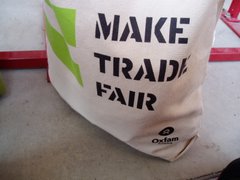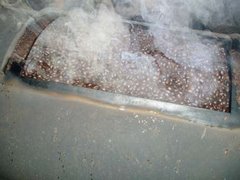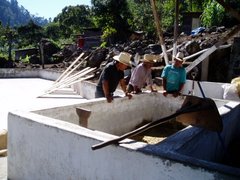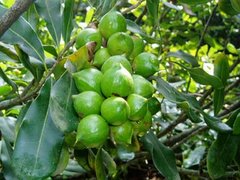Last week I attended an event which hosted a coffee cooperative delegation from Uganda. The name of the cooperative is Mirembe Kawomera, which means Delicious Peace. This is an especially inspiring and encouraging fair trade initiative. What makes it unusual is that it is an interfaith cooperative, gathering Jewish, Muslim, Protestant and Catholic Christian coffee farmers together to put aside their differences and share a livelihood towards peace and sustainability in their country. I was so struck by this local grassroots and transnational effort that combines economics with peacemaking (as E.F. Schumacher would say, "Economics as if People Mattered"). The cooperative's coffee is sold in the U.S. by California-based Thanksgiving Coffee.
The event featured four panelists representing each of the different faiths represented in the cooperative and a representative of Thanksgiving Coffee. They shared the vision and history of the project and discussed in real honest ways some of the challenges they face in the Fair Trade marketplace. For instance, while Thanksgiving Coffee has ordered more and more coffee from the cooperative in recent years (from one container in the first year in 2005 to three last year) they have been unable to sell a majority of the coffee from year to year. I asked a question inviting the panel to discuss the limitations of fair trade from the producer's perspective. One of the panelists indicated that fair trade was good when coffee prices are low because it provides a stable and higher price. However, when prices are high(er), as is the case now, it makes little difference since it provides a fixed price. In other words, not only is it constrained by market realities that influence consumption, it also does not adjust to market shifts in terms of pricing in order to indicate that Fair Trade is really a better deal. At the current point, he mentioned that the Fair Trade premium is only five cents. This was a refreshing moment to understand the benefits that that can exist through Fair Trade and the kinds of relationships that are possible. It was also a meaningful exchange on how Fair Trade can really be made fair in the eyes of the producer. Overall, I was just blown away by the hope-filled endeavors of this coffee cooperative which demonstrate our overriding potentials for understanding, human harmony and interdependence.
Monday, March 17, 2008
Subscribe to:
Post Comments (Atom)






1 comment:
Great blog Patrick! I sent it along to some coffee aficionados in my office. I was int he grocery store the other day and really wanted some bread and butter pickles. They were all out except the Mt. Olive brand. Suddenly, I remembered learning about terrible anti-labor and exploitative practices at Mt. Olive and had to really think about whether I wanted those pickles. In the end, I decided not to get them. Am I telling this story to toot me own horn? Maybe. Actually, I think when consumers are informed about what they are buying, when economics is humanized, then they make better choices. All of us could make better choices if we had better information. It doesn't end there, of course. People who are deeply concerned about fair trade, labor issues, environmental issues and more have a responsibility to push companies to change. Love the blog, can't wait to read more!
Post a Comment